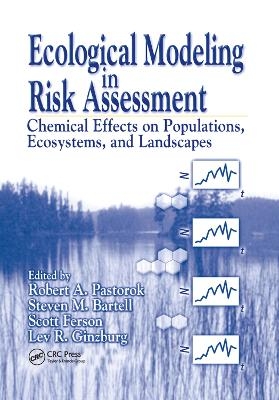
Ecological Modeling in Risk Assessment
CRC Press (Verlag)
978-0-367-39680-0 (ISBN)
The authors give an overview of the current process of ecological risk assessment for toxic chemicals and of how modeling of populations, ecosystems, and landscapes could improve the status quo. They present a classification of ecological models and explain the differences between population, ecosystem, landscape, and toxicity-extrapolation models. The authors describe the model evaluation process and define evaluation criteria. Finally, the results of the model evaluations are presented in a concise format with recommendations on modeling approaches to use now and develop further.
The authors present and evaluate various models on the basis of their realism and complexity, prediction of relevant assessment endpoints, treatment of uncertainty, regulatory acceptance, resource efficiency, and other criteria. They provide models that will improve the ecological relevance of risk assessments and make data collection more cost-effective. Ecological Modeling in Risk Assessment serves as a reference for selecting and applying the best models when performing a risk assessment.
Robert A. Pastorok, Steven M. Bartell, Scott Ferson, Lev R. Ginzburg
INTRODUCTION. Objectives. Selecting and Using Ecological Models in Ecological Risk Assessment. METHODS. Compilation and Review of Models. Selection of Models for Further Development and Use. Workshop on Ecological Modeling. RESULTS OF THE EVALUATION OF ECOLOGICAL MODELING. Population Models - Scalar Abundance. Population Models - Life History. Population Models - Individual-Based. Population Models - Metapopulations. Ecosystem Models - Food-Webs. Ecosystem Models - Aquatic. Ecosystem Models - Terrestrial. Landscape Models - Aquatic and Terrestrial. Toxicity-Extrapolation Models. ENHANCING THE USE OF ECOLOGICAL MODELS IN DECISION-MAKING. CONCLUSIONS AND RECOMMENDATIONS. REFERENCES.
| Erscheinungsdatum | 30.09.2019 |
|---|---|
| Verlagsort | London |
| Sprache | englisch |
| Maße | 178 x 254 mm |
| Gewicht | 598 g |
| Themenwelt | Naturwissenschaften ► Biologie ► Ökologie / Naturschutz |
| Technik ► Umwelttechnik / Biotechnologie | |
| ISBN-10 | 0-367-39680-7 / 0367396807 |
| ISBN-13 | 978-0-367-39680-0 / 9780367396800 |
| Zustand | Neuware |
| Haben Sie eine Frage zum Produkt? |
aus dem Bereich


